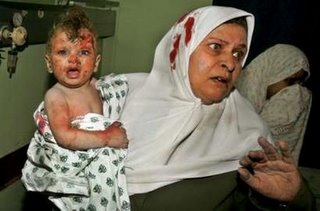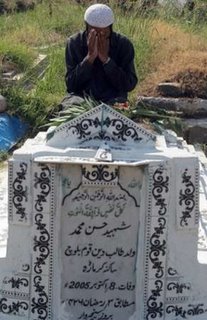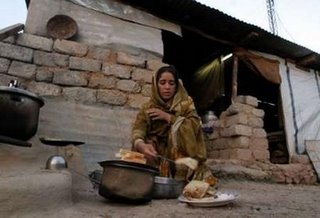It's interesting to note all the criticism being directed at Jordan recently, including allegations of mistreatment of laborers as well as involvement in the American policy of "
extraordinary rendition". An
article in Sunday's
Los Angeles Times added to this 'bad publicity', so to speak, and sheds light on the increasing proximity of the Jordanian monarchy and intelligence community to their counterparts in the US.
The article notes an increased detachment between the "too modernized" king and most members of the Jordanian populace. The writer goes
as far as saying that the fate of the King
Abdullah II may be similar to that of the infamous Shah Pahlavi in Iran. I won't try to summarize the article, but do
have a look for yourself. This is an excerpt:
[C]ritics on both sides of the Jordanian divide say the 44-year-old king has failed to garner popular support. Descendants of the tribes that are the monarchy's base criticize the king for failing to abide by tribal customs and losing touch with his supporters. They whisper the name of Abdullah's popular younger brother, Hamzeh. Palestinian groups and activists fear that the government in Amman has gotten too close to Washington, has adopted the Bush administration's with-us-or-against-us worldview too thoroughly and is sliding on human rights and democracy.
As a Jordanian who doesn't live in Jordan, but visits frequently, I, like many others who visit it, would not be able to tell that such a rift exists between the monarchy and the people. In the streets of Amman,
Irbid, and other cities, one can barely walk two blocks without seeing the picture of the king plastered on mini-markets and corporate billboards. Talking to Jordanians would not get you to think twice about their loyalty to the king either as direct criticism of the royal family would land you at least a few nights in jail. This is not to say that Jordanian policies are not questioned by the local media and scrutinized by members of parliament. Despite recent developments and initiatives by the King to promote free trade and a new "national agenda" for reform, not much has taken place on the ground that has impacted the lives of the average Jordanians.
I wonder how Jordanians would react to this idea, if they would even want to have any reaction at all. It's interesting to note that the
Jordanian blogosphere which usually catches on to any Jordan-related article or story (especially in major American newspapers) hasn't picked up on this one...
In case you don't have access to the article through the LAT website, here it is in full: Jordan's King Risks Shah's Fate, Critics Warn
By Borzou Daragahi
October 1, 2006
AMMAN, Jordan — A politically inexperienced king takes control of a Middle Eastern monarchy from his powerful father, surrounds himself with U.S. military hardware and spies, loses touch with his people and is finally ejected in a popular uprising.
That was the tale of Mohammed Reza Shah Pahlavi, the pro-American ruler of Iran whose ouster ushered in the reign of Ayatollah Ruhollah Khomeini and three decades of Islamic rule.
Now many in this Arab country of more than 5 million people fear that a similar fate could befall King Abdullah II, the Jordanian monarch who assumed power after his charismatic father died in 1999.
"Until now in Amman we don't have a Khomeini," said one mid-ranking official serving the Jordanian Cabinet. "If there was a Khomeini, then this family would be in trouble."
The king's father, Hussein, deftly balanced his country's contradictory pressures. He paid respects to the conservative East Bank tribes' demands for stability while also attending to calls from the nation's more cosmopolitan majority Palestinians for democratic change.
But critics on both sides of the Jordanian divide say the 44-year-old king has failed to garner popular support. Descendants of the tribes that are the monarchy's base criticize the king for failing to abide by tribal customs and losing touch with his supporters. They whisper the name of Abdullah's popular younger brother, Hamzeh. Palestinian groups and activists fear that the government in Amman has gotten too close to Washington, has adopted the Bush administration's with-us-or-against-us worldview too thoroughly and is sliding on human rights and democracy.
"King Hussein was an artist," said Ivan Eland, for 17 years a staff member of the House Foreign Affairs Committee and now an analyst at the Oakland-based Independent Institute, a think tank. "He was roundly criticized for supporting Saddam [Hussein] in the first Gulf War. But in retrospect, he looked pretty smart.
"The son has gotten more in bed with the United States," he added. "He hasn't been distancing himself from American policy. That has put him in a hole he hasn't been able" to get out of.
Numerous parallels exist between the shah's rule and that of Abdullah. Like the shah's SAVAK security and intelligence service, Jordan's General Intelligence Department, now in a new hilltop complex in an Amman suburb, operates as a "subdivision" of the CIA, said Alexis Debat, a former French Defense Ministry official who is a counter-terrorism consultant and a senior fellow at the Nixon Center in Washington.
By Debat's estimates, the Jordanian intelligence agency receives at least $20 million a year in U.S. funding for operations and liaison work. "They're doing all the legwork for the CIA," he said.
The Jordanians have become one of Washington's closest allies in the intelligence-gathering business, second only to Britain's MI6, counter-intelligence experts say. They are closer to the CIA than the Mossad, Israel's much-touted intelligence agency, which is considered to have too much of an agenda of its own to be completely reliable, Debat said.
Like the Iran of the 1970s, Jordan has become a receptacle of U.S. interests and trade. American aid to the kingdom has totaled $3.59 billion over the last five years, compared with $1.36 billion during the previous five years, according to the Congressional Research Service.
Like the shah's regime, the Jordanian monarchy has surrounded itself with American hardware. Just before Hussein's death, Amman took delivery of 16 advanced F-16 fighter jets. "That was a sort of threshold that Jordan crossed," said Michael R. Fischbach, a professor of history at Randolph-Macon College in Virginia. "They got truly advanced weaponry. It made Jordan have aircraft on par with Israel."
U.S.-made military hardware abounds on Jordan's streets. Jordanian soldiers carrying American-made M-16 assault rifles and riding in olive-green U.S.-made Humvees watch over sensitive military and political sites in Amman, the capital. Convoys of U.S. military transport trucks move in and out of the country.
Perhaps most controversially, say Amnesty International and other human rights groups, Jordan has become an important nexus in U.S. intelligence's subterranean "renditions" network, in which terrorism suspects are secretly detained and interrogated in countries with blemished human rights records. Jordanian officials deny participation in the program.
Many worry that bolstering Jordanian security forces amid widespread reports of abuses against detainees has hampered the country's baby steps toward democratization.
"The security forces are improving at the cost of democracy," said Hamzeh Mansur, a leader of the Islamic Action Front, the main Islamist parliamentary bloc.
Jordanian officials say the security apparatus has been ramped up and civil liberties laws tightened out of fear the country will become a staging ground for secretive cells plotting violent operations in Iraq, Israel and the Palestinian territories. Jordan has also been victimized by terrorism, including the Nov. 9, 2005, bombings of three Amman hotels that killed dozens.
"You have to combat terrorism while it's in its planning stage," said Nasser Joudeh, a government spokesman. "We will not allow Jordan to be used as a scene for any activity relating to non-Jordanian problems. We will not allow anyone to bring militant or extremist ideas into Jordan or export them elsewhere."
But the Hashemite kingdom's evident close ties with Washington and its leap into the U.S.-declared war on terrorism threaten to put the government on what some call a collision course with many of its people, especially in light of a sharp increase in anti-American sentiment after the U.S.-led invasion of Iraq in 2003 and Israel's recent bombing of Lebanon in the Jewish state's war against Shiite Muslim militants.
"Being darlings of the U.S. is considered bad, bad, bad," said a Western analyst based in Jordan who requested anonymity.
Jordanian government officials say the security forces have become less heavy-handed in their approach. "I am liberal-minded," said Maj. Gen. Mohammed Dahabi, the chief of Jordanian intelligence, who says he was appointed in December with a mandate to clean up the service's reputation as well as confront the growing threat of Islamic militants in neighboring Iraq and the West Bank.
However, confronted by the recent allegations of torture, the officials acknowledge that the past casts a long shadow on the country.
"Old habits die hard," said Dahabi, who represents a segment of the tribal-dominated security forces that strongly supports the king.
Few publicly speak out against the king because of a law that can be used to prosecute those who do. "Criticisms of the king and the intelligence forces are strictly taboo and carry serious penalties," says a January 2006 Human Rights Watch report. "Articles of the penal code criminalize speech slandering public officials, criticizing the king and his family, and harming relations with other states."
But Abdullah has emboldened a legion of critics among the country's tradition-minded tribes that are the backbone of the monarchy.
"He talks about information technology and foreign investment, but he doesn't really know his own people," said the government official, who spoke on condition of anonymity because of his sensitive position within the Cabinet.
"The tribes are very upset with him," said the Western analyst in Amman.
"The impression is that he's too Westernized."
Many critics say the monarch has been too busy pursuing a Western agenda instead of forging ahead with a vision for uniting the country, which remains divided between the powerful tribes and the numerous Jordanian nationals of Palestinian descent.
"He has ambitions to make Jordan a modern country," said Jean-Robert Leguey-Feilleux, a scholar of Middle East politics, diplomacy and terrorism at St. Louis University. "You can't do that without the support of the people."
[technorati tags: Jordan, US, politics]













